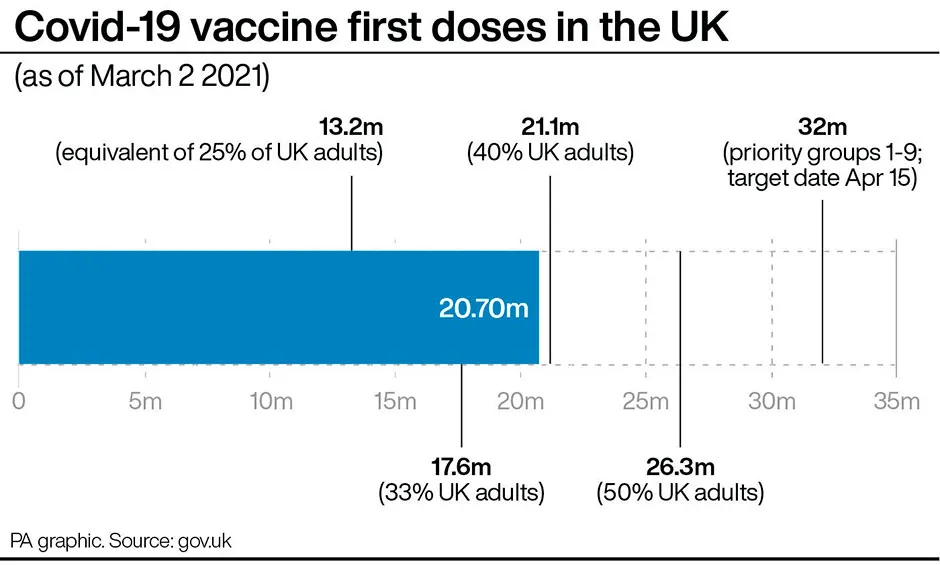The Pfizer vaccine may be effective against the Brazil, UK and South Africa coronavirus variants, a new study suggests.
The research also indicates the Pfizer vaccine generated an antibody response against the variants when tested in a laboratory against an engineered version of the virus, with blood samples taken from 15 people who had received the jab.
The new coronavirus variants carry mutations which change the spike protein of the virus which it uses to attach to human cells, and may also have an impact on transmission.
Researchers found that levels of neutralising antibodies were generated against all of the variants, although this did vary quantitatively between variants.
According to the correspondence published in New England Journal Of Medicine, the response was greatest against the original variant, and against the more transmissible B117 variant first detected in Kent.
Read more about coronavirus variants:
- Can we stop the spread of more coronavirus variants?
- Bristol variant could infect people who have been vaccinated
- Moderna vaccine 'effective against new variants'
It was slightly lower against the P1 Brazil variant, and lower still against the B151 variant first identified in South Africa, the researchers from the University of Texas Medical Branch and Pfizer found.
“Reassuringly, while the levels were lower for the P1 and B151 variants, they were still substantial, and likely to indicate that the vaccine will be effective," said Dr Peter English, consultant in communicable disease control, who was not involved in the research.
“The authors remind us that these are laboratory findings, based on serum from only 15 individuals, and that other aspects of the immune response, such as T-cell (cellular) immunity are likely to be important in real-world vaccine efficacy, and the vaccine ‘elicits CD8+ T-cell responses that recognise multiple variants’.
“Taken together, these findings indicate that this vaccine is likely to be effective against the variants studied, although precisely how effective they are in the real world will require data on the vaccine’s actual effect in populations, not just in laboratory studies such as this one.”

He added: “This study looked only at the neutralising antibody levels generated in the serum of people who had received two doses of the Pfizer/BioNTech vaccine. In itself, this study does not provide any evidence about other vaccines.
“However, we know that other available vaccines use precisely the same antigen, albeit delivered in different ways. Given this, it is highly plausible that other vaccines will have similar efficacies against these variant strains but we do not know this for certain.”
How do scientists develop vaccines for new viruses?
Vaccines work by fooling our bodies into thinking that we’ve been infected by a virus. Our body mounts an immune response, and builds a memory of that virus which will enable us to fight it in the future.
Viruses and the immune system interact in complex ways, so there are many different approaches to developing an effective vaccine. The two most common types are inactivated vaccines (which use harmless viruses that have been ‘killed’, but which still activate the immune system), and attenuated vaccines (which use live viruses that have been modified so that they trigger an immune response without causing us harm).
A more recent development is recombinant vaccines, which involve genetically engineering a less harmful virus so that it includes a small part of the target virus. Our body launches an immune response to the carrier virus, but also to the target virus.
Over the past few years, this approach has been used to develop a vaccine (called rVSV-ZEBOV) against the Ebola virus. It consists of a vesicular stomatitis animal virus (which causes flu-like symptoms in humans), engineered to have an outer protein of the Zaire strain of Ebola.
Vaccines go through a huge amount of testing to check that they are safe and effective, whether there are any side effects, and what dosage levels are suitable. It usually takes years before a vaccine is commercially available.
Sometimes this is too long, and the new Ebola vaccine is being administered under ‘compassionate use’ terms: it has yet to complete all its formal testing and paperwork, but has been shown to be safe and effective. Something similar may be possible if one of the many groups around the world working on a vaccine for the new strain of coronavirus (SARS-CoV-2) is successful.
Read more: